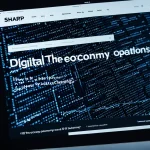Unleashing AI: Transforming Music Composition and Sound Engineering for a New Era of Creativity
The music industry is on the cusp of a revolution, driven by the rapid advancement of artificial intelligence (AI). From composition to sound engineering, AI is redefining the creative process, offering musicians, composers, and producers unprecedented tools and opportunities. In this article, we will delve into the transformative impact of AI on music creation, exploring its potential, challenges, and the future of this symbiotic relationship between human creativity and machine learning.
The Evolution of AI in Music Composition
The integration of AI in music composition is not a new concept, but it has gained significant momentum in recent years. Here are some key milestones and examples that illustrate this evolution:
Also read : Transforming surgery: how augmented reality revolutionizes precision in complex procedures
Early Beginnings
The journey began in the 1950s with the ILLIAC (Illinois Automatic Computer), which generated the first original composition by a computer. Professors Lejaren Hiller and Leonard Isaacson programmed ILLIAC to produce random notes based on classical composition rules, marking the inception of AI-generated music[1].
Modern Innovations
Fast forward to 2018, when Taryn Southern, a YouTube personality and former “American Idol” contestant, collaborated with AI to produce the pop album “I AM AI.” This project used multiple AI programs that analyzed vast amounts of pop music to generate rhythms, chords, and melodies. Southern views AI as both a tool and a collaborator, highlighting the collaborative potential of human-AI interaction[1].
Have you seen this : Transforming rural emergency medical response: how drone technology is changing the landscape in the uk”s outskirts
Contemporary Examples
- AIVA: This AI system claims to compose emotionally filled soundtracks by learning from the works of great classical composers to contemporary artists. AIVA can generate original pieces in seconds, making it a valuable tool for musicians and composers[1][3].
- Holly Herndon & Jlin (feat. Spawn): The California-based composer Holly Herndon and her partner created an AI named Spawn, which listens to performances and generates new music. Herndon notes that Spawn’s creations reflect the current state of AI knowledge, emphasizing the ongoing development in this field[1].
AI Music Generation Tools: A Comprehensive Overview
The market is flooded with AI music generation tools, each offering unique features and capabilities. Here’s a detailed look at some of the most notable ones:
AIVA
- Key Features: Generates new songs in over 250 different styles, allows users to upload their own audio or MIDI files to create custom style models[3].
- Limitations: Users can generate only up to five compositions at a time; the preview may not always match the final output[3].
- Pricing: Free Forever plan, Standard ($11/month + VAT), Pro ($33/month + VAT)[3].
Amper Music
- Key Features: Allows users to choose from various styles, ambiances, instruments, and tempos. Integrates seamlessly with popular music editing software[3].
- Limitations: The commenting system requires scrolling to view all notes, complicating team communication[3].
- Pricing: Free, Personal License ($5), Professional License ($25), Commercial License ($99), Online Advertising License ($499)[3].
Brev.ai
- Key Features: Uses Suno V3.5 technology to convert text descriptions into original music, including songs with lyrics and instrumental tracks. Offers numerous customization options[4].
- Accessibility: Available online for free, with powerful tools for creating music without cost[4].
- Applications: Supports a wide range of applications, from video and podcast soundtracks to video game soundscapes[4].
Jukedeck
- Key Features: Allows users to generate original music with customized parameters such as genre, instruments, and duration. Automatically adjusts music to fit video contexts[3].
- Acquisition: Acquired by TikTok, further integrating AI music generation into social media platforms[3].
The Advantages and Challenges of AI in Music Creation
Advantages
- Enhanced Creativity: AI inspires new ideas and creative approaches, enabling musicians to explore uncharted musical territories[2].
- Increased Efficiency and Productivity: Automation of certain musical processes accelerates production, allowing artists to focus on the more creative aspects of music[2].
- Personalization: AI enables the creation of music tailored to individual preferences, offering a personalized listening experience[2].
- Exploration of Styles and Genres: AI facilitates experimentation with various musical styles by fusing elements from different genres to create new artistic forms[2].
Challenges
- Originality and Authenticity: Concerns persist about the originality and authenticity of AI-generated music. Is it truly creative, or is it just a sophisticated imitation?[2]
- Copyright and Intellectual Property: The attribution and ownership of AI-generated compositions raise complex legal and ethical questions[2].
- Algorithmic Biases: AI models can inherit biases from the training data, potentially leading to prejudiced music generation[2].
- Human Interaction: The collaboration between human creators and AI raises questions about the role of the artist and the ethical implications of machine-assisted music[2].
Table: Comparative Overview of AI Music Generation Tools
| Tool | Key Features | Limitations | Pricing |
|---|---|---|---|
| AIVA | Generates music in 250+ styles, custom style models | Limited to 5 compositions at a time, preview issues | Free Forever, Standard ($11/month), Pro ($33/month) |
| Amper Music | Customizable styles, ambiances, instruments, tempos; integrates with editing software | Commenting system issues, team communication complications | Free, Personal ($5), Professional ($25), Commercial ($99), Online Advertising ($499) |
| Brev.ai | Converts text to music, numerous customization options | None notable | Free |
| Jukedeck | Customized parameters, automatic video context adjustment | Acquired by TikTok, integration limitations | Not specified |
| Melomics | Advanced algorithms, various musical styles | None notable | Free |
The Future of Music Production: Human Creativity Meets Machine Learning
As AI continues to evolve, it is clear that the future of music production will be a blend of human creativity and machine learning. Here are some insights into what this future might hold:
Real-Time Collaboration
AI can now collaborate with musicians in real-time, generating music that is both original and responsive to the artist’s input. For instance, tools like Amper Music allow for seamless integration with music editing software, enabling artists to refine AI-generated tracks in real-time[3].
Personalized Music Experiences
AI can create music that is tailored to individual listeners’ preferences. Platforms like Brev.ai and Melomics use advanced algorithms to generate music based on user descriptions or preferences, offering a highly personalized listening experience[2][4].
Ethical Considerations
As AI-generated music becomes more prevalent, ethical questions arise. For example, who owns the rights to music composed by an AI? How do we ensure that AI models do not perpetuate biases present in the training data? These are critical issues that the music industry must address to maintain the integrity and value of music creation[2].
Practical Insights and Actionable Advice for Musicians
For musicians looking to leverage AI in their creative process, here are some practical tips:
Experiment with Different Tools
Try out various AI music generation tools to find the one that best fits your creative vision. Each tool has its unique features and limitations, so experimentation is key[3][4].
Collaborate with AI
View AI as a collaborator rather than a replacement. Use AI to generate ideas, but also be involved in the creative process to ensure the music reflects your artistic vision[1].
Understand the Legal Implications
Be aware of the legal and ethical implications of using AI in music creation. Ensure you understand the terms of use and ownership rights associated with AI-generated music[2].
Quotes from Industry Experts
- Taryn Southern: “I consider AI as much a tool as a collaborator. It’s not about replacing human creativity but about enhancing it.”[1]
- Holly Herndon: “Spawn is still a baby But it illustrates honestly the state of our knowledge in the field of AI.”[1]
- Lejaren Hiller: “The use of computers in music composition is not just about generating notes; it’s about exploring new musical territories.”[1]
The integration of AI in music composition and sound engineering is a game-changer for the music industry. It offers unparalleled opportunities for creativity, efficiency, and personalization. However, it also poses significant challenges related to originality, authenticity, and ethical considerations.
As we move forward into this new era of music creation, it is crucial to embrace AI as a complementary tool to human creativity. By understanding the potential and limitations of AI, musicians and composers can harness its power to create innovative, high-quality music that resonates with audiences worldwide.
In the words of Holly Herndon, “AI is still in its infancy, but it’s already showing us the incredible possibilities it holds for the future of music.” As we continue to explore and develop these technologies, one thing is clear: the future of music is brighter, more creative, and more diverse than ever before.











